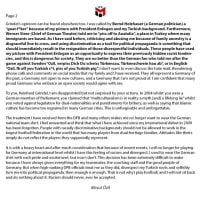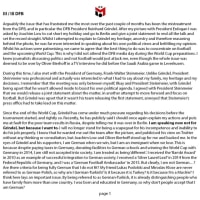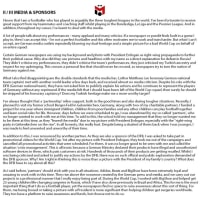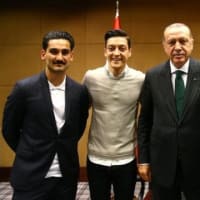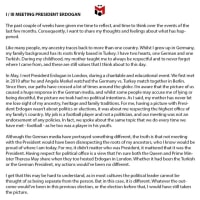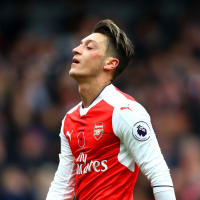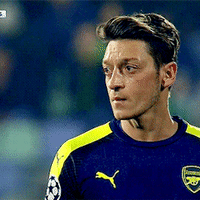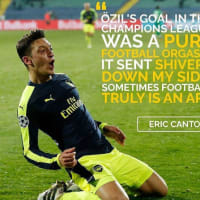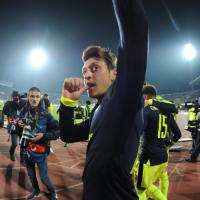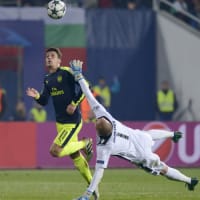
ワールド・カップ準々決勝の試合開始前、両チームのキャプテンは、人種差別撤廃の宣誓を読み上げますね。
ドイツ代表も、4年前はバラックが、そして今年はラームが宣誓しました。
あれは、裏を返せばサッカーの世界には未だ人種差別の壁がある、ということでしょう。
今回フランス代表の崩壊にも、差別が陰を落としていることを臭わす記事がありました。
Times
Players strike awoke 'racism' in France says Thuram
Jul 17, 2010 12:52 PM | By Sapa-AP
『選手達のストライキは、フランス国内に残る人種差別問題を目覚めさせた』
According to former France defender Lilian Thuram, players on the national team have "awakened the underlying racism in society" with their strike at the World Cup.
前フランス代表ディフェンダー、ティラムは、代表チームは先のワールド・カップにおけるストライキで、社会の底を流れている『人種差別』に気付いた、と述べている。
Thuram said French people could now easily make a “shortcut” and think that “all the problems result from the fact that there are too many blacks in the France team.”
『全ての問題は、フランスチームには、黒人選手が多すぎる、という事実から生じた。』
という安易な考えに行きかねない、とティラム。
この流れは少し、怖いです。
7月6日にも書きましたが、現ドイツ代表チーム23人中11人が移民の子供達、外国籍を持つ、multiculiとか、
M世代とか呼ばれる選手達。
ドイツが移民政策を変え、外国からの移民達の市民権を確立させたのが1999年。代表チームに移民達を受け入れるようになったのは、1999年からだ、と知りました。1998年WCフランス大会で、他民族、多国籍構成のチームで優勝を果たしたフランスチームを見ての決断だったとのこと。
そのフランスが、(ドメニク監督問題は別として)底辺に人種的偏見問題を内包していて、それが今回のボイコット、チーム崩壊に繋がったとしたら、フランスの後に続いて代表選手枠を規制緩和したドイツも、将来同じような問題が、10年先、20年先に表面化しないとも限らないのでは、と考えてしまったからです。
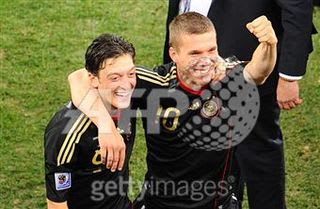
The Observerの Kate Connolly記者による以下の記事、興味深く読みました。
Germans Love 'multiculti' World Cup Soccer Team
多種文化混在のWC代表チームを愛するドイツ国民
Yagiz Dogan wants a pair of orange and silver soccer shoes like those worn by German soccer player Mesut Ozil.
"I'm saving up for them, after all he's my hero,"said the 15-year-old, who lives in a flat in the Berlin district of Neukolln with his Turkish parents nad grandparents.
ベルリン市内にトルコ人の両親、祖父母と共に暮らす15歳のYagiz Dogan君は、ドイツ代表のメスト・エジルが履く物と同じような、オレンジと銀色のサッカーシューズを欲しがっている。
『同じ物を買いたくて貯金してるんだ。だってエジルは僕のヒーローだから。』
Yagiz hung a German flag from the window, much to the confusion of his mother.
"Of course I want Germany to win the World Cup," he said before its July 7 semifinal loss to Spain.
Yagizは窓からドイツの旗を垂らしており、これが母親を困惑させている。
『もちろん、僕はドイツに優勝してほしい。』
と彼は、スペインとの準決勝前に語っていた。
He also thinks it's fine that Ozil, the German-born son of Turkish immigrants, has chosen to play for Germany rather than Turkey.
彼は、トルコ人移民の両親を持つドイツ生まれのエジルが、トルコではなくドイツ代表としてプレーすることを選んだのは、良い選択だったと思っている。
"What shuld be strange about that? He was born here, brought up here, he speaks the language, understands the culture--just like me. I can identify with him."
『何がヘンだと言うのだろう?彼はここドイツで生まれ、ドイツで育ち、ドイツ語を話し、ドイツの文化を理解しているーーちょうど僕のようにね。』
(ふたつの国籍をもつエジルは、ドイツ代表を選んだ時、トルコから相当な非難を浴びたそうです)

The boy could be speaking for Ozil. But what's clear from talking to him is how natural it is for a whole generation of young Germans --known as "M" or "multiculti"--that theeir national soccer team comes from a diverse range of backgrounds.
この少年はエジルについてのみ話をしているのかもしれない。
しかし、この少年との話から明らかになったことは( M世代 、あるいは multiculti、として知られている)若いドイツ人世代全般に、彼らの代表チームが多様な背景や経歴をもっている、ということが、非常に自然に受け入れられている、ということだ
Not only is the German team the youngest it has been since 1934--half the squad are 24 or under--it is also the most ethnically diverse it has ever been.
ドイツチームは、 1934年後最も若いチーム -- チームの半数が24歳以下-- であるばかりか、これまでで最も民族面で多様なチームでもある。
No fewer than half of the players were either born outside Germany, are sons of immigrants or have one non-German parent, with roots in Ghana, Poland, Tunisia, Turkey and other countries.
半数を下らないプレーヤー達がドイツ以外で生まれているか、移民の息子達であるか、あるいは両親がドイツ人ではなく、ガーナ、ポーランド、チュニジア、トルコ、その他の出身者だ。
The effect of such a radical transition cannot be overstated in a country that for years did not consider itself a land of immigration and where foreigners brought in to fill the skills gap were deliberately called "guest workers" on the understanding, or hope, that they would go home.
こうした急激な変化による影響は、誇張されて語ることは出来ない。この国は長年に渡り、自身を移民の国ではない、と考え、労働力不足を埋めるための外国人労働者を『ゲストワーカー』と意図的にゲストと呼び、彼らはいずれ自国へ帰る人達、帰ってほしい人達、と考えていた。
The change has come about thanks to a 1999 revamp of citizenship laws. Half the current team's players would not have been allowed in just over a decade ago.
変化が起きたのは、1999年、市民権法が改正されたお蔭だ。ほんの10年前だったら、現在のチームのプレーヤーの半数は、代表チームでプレーすることが許されなかったのだ。
Some bloggers on far-right Web sites have railed in anger, insisiting that the team was "no longer German".
ある極右のウェブサイトでは、今のチームは『もはやドイツチームではない』と主張し、怒りを露わに毒づいている。
One poster boy of the new generation is 23-year-old midfielder Sami Khedira, whose father emigrated from Tunisia to Germany 30 years ago to work in a steel foundry.
多文化世代を象徴するようなひとり、23歳に中盤、サミ・ケディラは、30年前に鋼鉄鋳物工場で働くためチュニジアから移住してきた父親を持つ。
"I think it's an advantage to be a player of mixed origins. When two nationalities come together, it brings advantages--(Tunisian)emotions coupled with Gerrman virtures of discipline, ambition, concentration," he said.
『ハーフやクオーターの選手というのは有利だと思います。二つの国民性が一緒になると、メリットが増えますよ。チュニジアの感情豊かなところと、ドイツの美点である規律、大きな志、集中力などが合わさるのですからね。』
Ozil, arguably the star of this team, said that he sees his "Turkish side" coming out in his technique and feel for the ball, "and the give-it-your-all attitude to my game is the German part of me."
このチームの、ほぼ間違いなくスターであろうエジルは、彼のテクニークとボールへの感性はトルコ側の自分、試合へ全力を傾ける気持ちの強さはドイツ側の自分だとみている、と話した。
It is hard to believe Ozil, 21, who recites the Quran during the singing of the national anthem, would have been accepted to the degree he has been, even five years ago.
試合前の国家斉唱の際にコーランを朗誦した21歳のエジルは、5年前なら、今回彼が受け入れられたようには、受け入れられなかっただろう。

エジルは若いドイツチームで目を引かれる選手のひとり。見守っていきたいなあ、と思います。
ポルディやクローゼというやはり異国籍をもつ先輩達もいますが、移民の立場の選手はドイツという国の事情もあって、複雑そうです。
資料を読んでみると移民の人々の流入で変わりつつあるドイツ社会とドイツサッカーは興味深いテーマです。先の記事でスポーツ省大臣も述べていたように、代表チームが多民族融合の象徴的存在になると、素晴らしいなと思います。
( 『西ヨーロッパにおける移民問題』を参考にさせていただきました。)











